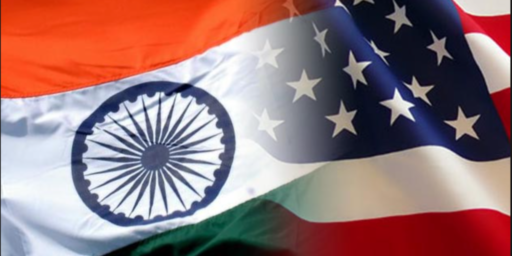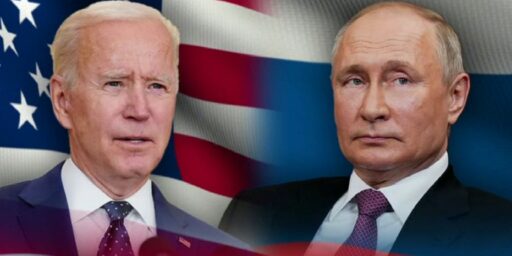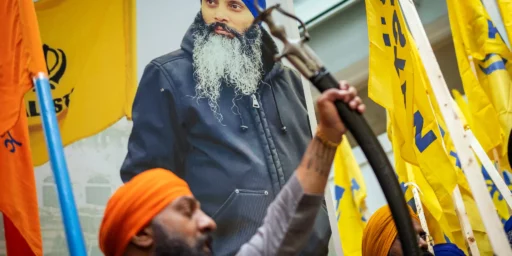Bill Richardson’s New Realism
Bill Richardson sets forth his foreign policy vision in a piece called “New Realism: Crafting a US Foreign Policy for a New Century” published in the Harvard International Review.
The beginning is standard boilerplate, with plenty of sops to the base thrown in:
US foreign policymakers face novel challenges in the 21st century. Jihadists and environmental crises have replaced armies and missiles as the greatest threats, and globalization has eroded the significance of national borders. Many problems that were once national are now global, and dangers that once came only from states now come also from societies—not from hostile governments, but from hostile individuals or from impersonal social trends, such as the consumption of fossil fuels.
That’s all innocuous enough, although it’s rather dubious to argue that “environmental crises” and “the consumption of fossil fuels” are now foreign policy threats on par with terrorism; indeed, he largely abandons that pretense for the remainder of the piece, which does a creditable job of laying out the problems before us and arguing that the Bush Administration has not taken the appropriate measures to deal with them.
The second half of the piece lays out, in fairly detailed terms, Richardson’s plan. The highlights:
- “First and foremost, the United States must repair its alliances.”
- “US leaders also must restore their commitment to international law and multilateral cooperation . . .”
- “[P]romoting expansion of the UN Security Council’s permanent membership to include Japan, India, Germany, and one country each from Africa and Latin America.”
- “[E]thical reform at the United Nations so that this vital institution can help its many underdeveloped and destitute member states meet the challenges of the 21st century.”
- “[E]xpanding the G8 to include new economic giants like India and China.”
- “The US government must join the International Criminal Court and respect all international treaties, including the Geneva Conventions.”
- “On environmental issues, the United States must be the leader, not the laggard, in global efforts to reduce greenhouse gas emissions by embracing the Kyoto Protocol on global warming, and then, going well beyond it, leading the world with a man-on-the-moon effort to improve energy efficiency and to commercialize clean, alternative technologies.”
- “[S]top considering diplomatic engagement with others as a reward for good behavior.”
- Various efforts to contain nuclear proliferation, including ratification of the Comprehensive Test Ban Treaty
- “The United States needs to start showing, both through its words and through its actions, that this is not, as the Jihadists claim, a clash of civilizations. Rather, it is a clash between civilization and barbarity.”
- “[C]losing Guantanamo.”
- “The United States also needs to pressure Egypt, Pakistan, Saudi Arabia, and other friends in the Arab world to reform their education systems, which are incubators of anti-US sentiment.”
- “[S]pend more to recruit, equip, and train more first responders and to drastically improve public health facilities, which, five years after 9/11, are not ready for a biological attack.”
- “The United States needs to lead the global fight against poverty, which is the basis of so much violence.”
- “Encourage all rich countries to honor their UN Millennium goal commitments.”
- “Lead donors on debt relief, shifting aid from loans to grants, and focus on primary health care and affordable vaccines.”
- “[P]romote trade agreements, which create more jobs in all countries and which seriously address wage disparities, worker rights, and the environment.”
- “[P]ressure pharmaceutical companies to allow expanded use of generic drugs, and it should encourage public-private partnerships to reduce costs and enhance access to anti-malarial drugs and bed nets.”
- [P]romote a multilateral Marshall Plan for the Middle East and North Africa.
Most of these policies have been Democratic Party platform bread and butter since probably the Truman Administration. Others, including various poverty reduction programs, amount to minor tweaks of existing U.S. policy. Overall, then, it’s quite sensible.
My major disagreements are on the former UN Ambassador’s quest for internationalism.
Expansion of the Security Council and G-8 actually make it much less likely that we’ll achieve his other goals of increasing multilateralism and adherence for international law. It’s hard enough to get France on board; adding the tyrants of Beijing to the equation doesn’t exactly make things easier. For that matter, increasing China’s power would complicate ethical reform at the UN, given different views as to what constitutes “corruption.”
Most importantly, joining the International Criminal Court is fraught with peril. Handing American sovereignty over to an organization dominated by Third World tyrannies simply makes no sense.
via Dave Dilegge






There was a time earlier this year where Richardson looked like a viable choice for a lot of Center-Right folks, particularly those who aren’t allergic to voting Dem. (Instapundit Republicans?) I would guess his polling showed that there weren’t enough of them to build a campaign around.
I’m not so sure… considering that China’s demand for fossil fuels is expected to grow enormously in the next 10-20 years, and that their economy may be better able to pay higher prices for it, our reliance on oil (foreign _or_ domestic) could very rapidly become a critical issue…
Not much doubt about that. It’s just not clear that there’s an IR solution to that. Rather, it seems to me, we need to develop alternate technologies and the infrastructure to replace the current gasoline pump model.
He has a whole bunch of “what the problems are” listed, but no too many hows.
He says America must repair alliances-okay-what alliances and how?
Half his article is devoted to “hows.” Indeed, just my bullet points above are pretty extensive and he fleshes those out in reasonable detail for a three pager.
Terrorism isn’t an existential threat, not by the wildest stretch of imagination. 9/11 was the most incredibly spectacular terrorist attack ever and the real physical effect was pretty negligible. Had we not freaked out (the psychological effect) we would have been just fine. Terrorism is no threat to us, our inability to think straight in a crisis and our inability to practice the “stiff upper lip” pose a moderate threat to our financial and civil liberties.
On the other hand environmental issue are a very real existential threat. A mean global temperature change of only a couple degrees will spark off a mass extinction which will directly threaten the ecosystem we rely upon. Shifts in weather patterns may radically alter growing conditions so that our entire current agricultural infrastructure becomes inapplicable. Modern transportation capabilities mean that a bug on par with the influenza pandemic of 1918 could kill, instead of 100 million, billions. Potable drinking water is becoming a scarce commodity. Air quality has seen improvements in the last few decades fortunately.
Don’t kid yourself about which has more capacity to harm us, and thus which is a greater policy (even foreign policy) issue- some cave dwelling religious nuts or the awesome power of mother nature.
“It’s hard enough to get France on board; adding the tyrants of Beijing to the equation doesn’t exactly make things easier. For that matter, increasing China’s power would complicate ethical reform at the UN, given different views as to what constitutes “corruption.—
huh?
Last time I checked, China was already a permanent member of the Security Council.
Richardson is proposing adding “Japan, India, Germany, and one country each from Africa and Latin America.”
Right but not the G-8. That paragraph isn’t as clean as it ought have been, I guess.
Tlaloc, why don’t you send me your home address. I’ll come over and run my car into your house. Oh, by the way, have your wife and children in the room where my car is going to smash into and then we’ll see how stiff your upper lip is.
And then your whole doom and gloom analyses of our current upswing of global temperature is almost amusing. The earth has been fluctuating its temperature since its creation. There isn’t much humans can do about “Mother Nature” and her mood swings. The experts I read state we are in the upswing of a 1500 year cycle. It will cool down when it’s time.
In the mean time, hope it isn’t your office building or airplane or bus or subway or etc. they target next.
Editor’s note: This comment is on the borderline of being in violation of site policies. I’m taking this as a poorly made analogy rather than an actual threat of bodily harm but there are better ways to make a point.
Why expand the G8? The UNSC? The answer, presumably, is to confer greater legitimacy on the institutions. I under how that helps those institutions but it’s not completely clear to me how doing that helps the United States.
The notion that Germany belongs on the UNSC is particularly puzzling. Europe is moving towards a federal system and already has two seats on the UNSC. Why is a third seat a good idea? Other than, perhaps, you like the way Germany is likely to vote. Would the way Germany is likely to vote be likely to help or injure American interests?
There’s more than one reason to place greater reliance on international institutions. If it’s to build greater support and consensus for doing the right thing, I’m all for it. If it’s as an alternative towards the U. S. taking action itself, it sounds like another word for isolationism.
As the world’s foremost proponent of free trade, the U. S. is already the leader in the “global fight against poverty”. Is that what he means? China and India’s increased foreign trade have done more to end poverty in those countries than every other anti-poverty program in human history combined. I note with chagrin that, unless this particular bullet refers to free trade, there doesn’t seem to be much about free trade in his list. That’s a shame because historically opening up trade has been one of our strengths.
Dave, Europe is never going to be a federal system, any more than the UN is going to be a world government. Take it from a European – we’re looking for a supranational EU, not a supernational one.
Regards, C
Europe already has something between a federation and a trading zone. 40 years ago only the most optimistic (if that’s the right word for it) would have predicted they’d have come this far. If anything resembling the proposed EU Constitution is adopted it wouldn’t be unreasonable to characterize it as a federation.
Regardless, I don’t see how including Germany makes any sense.